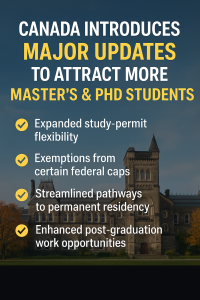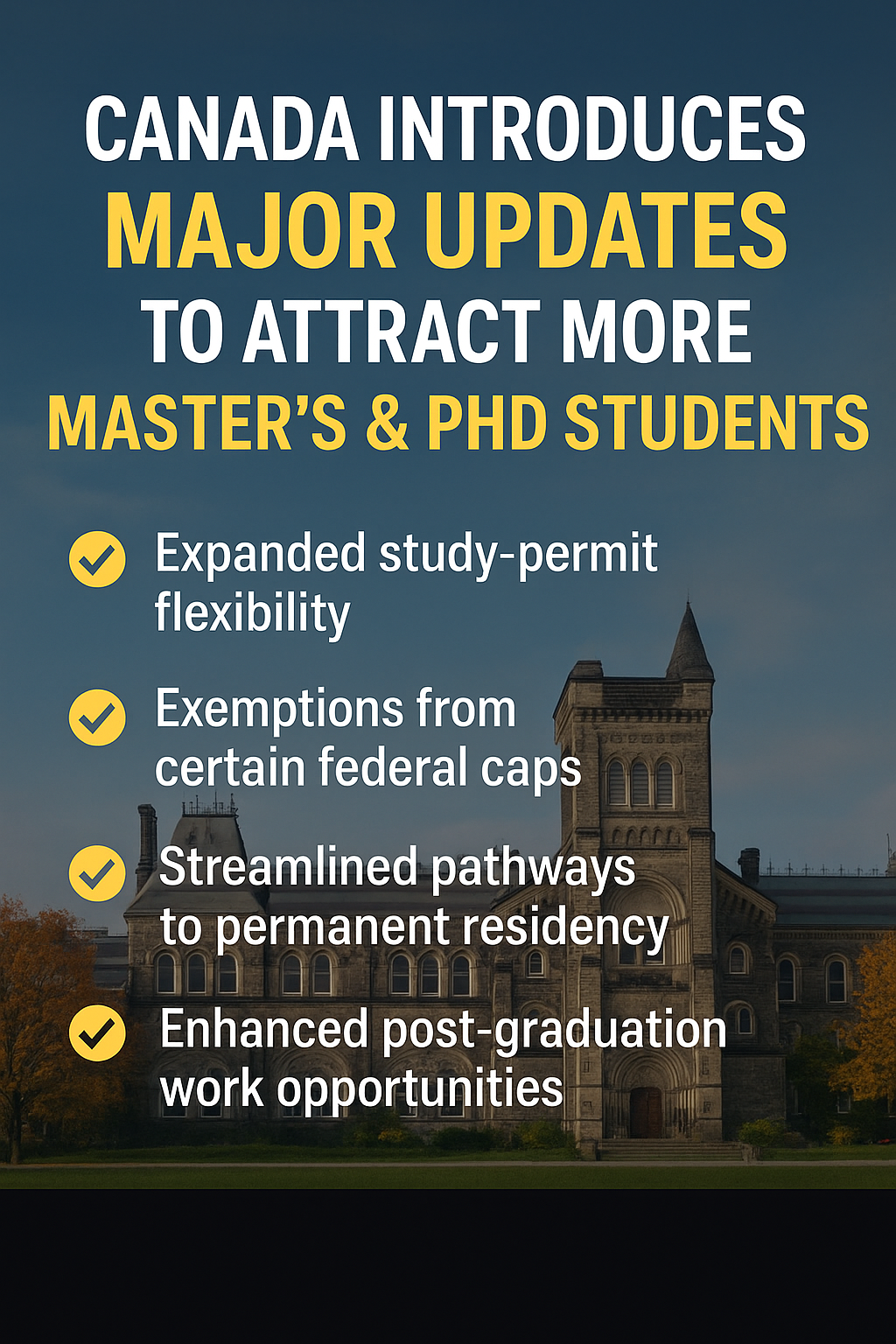
Global competition for international student recruitment is intensifying as countries increasingly recognize the value of attracting top research talent. Canada has emerged as a premier destination for graduate studies in Canada, especially for those pursuing master’s and PhD programs. Recent policy updates—including the study permit cap exemption and expedited permit processing—have dramatically reshaped the landscape, providing new opportunities for international students worldwide.
ScholarLink is designed to help students navigate this evolving environment by connecting them to the most suitable Canadian universities, scholarships, and research opportunities. In this article, we explore the latest policy developments, practical implications for international students, and how ScholarLink can guide applicants to achieve their academic and professional goals.
Canada’s New Graduate Policy Landscape
Canada has recently introduced transformative changes to facilitate international student mobility for graduate programs. Key highlights include:
- Study Permit Cap Exemption: Starting January 2026, international students enrolling in public universities for master’s and doctoral programs are exempt from the study permit cap. (icef.com)
- Fast-Track Permit Processing: Doctoral students and accompanying family members can now expect study permit processing within 14 days. (ca)
- Increased Recruitment Incentives: The Canadian government has announced strategic initiatives aimed at attracting research talent, including increased support for scholarships, fellowships, and post-graduation pathways. (ca)
These reforms reflect a clear government commitment to positioning Canada as a leading hub for global academic talent. By removing bureaucratic barriers and accelerating visa processing, Canada is opening doors to the next generation of innovative researchers.
Why These Changes Matter for International Students
1. Enhanced Access to Top Canadian Universities
The study permit cap exemption significantly broadens access to public Canadian institutions. Previously, the quota system limited opportunities, forcing many students to consider alternative destinations. With the cap removed, international students now have a clear pathway to pursue graduate studies in Canada without arbitrary limitations.
2. Faster Permit Processing Enables Strategic Planning
With processing times reduced to 14 days for doctoral students and their families, applicants can better coordinate travel, accommodation, and research schedules. This efficiency allows students to focus on academic preparation and early integration into the Canadian research environment.
3. Expanded Scholarship Opportunities
Canada offers an array of scholarship opportunities for graduate students, including the Canada Graduate Scholarship – Master’s Program (CGS-M), which provides CAD $27,000 for 12 months. (nserc-crsng.gc.ca) Platforms like ScholarLink.ai can help students identify and apply for funding, improving the financial feasibility of studying abroad.
4. Increased International Student Mobility
Canada’s proactive recruitment policies are designed to attract high-caliber research talent from around the world. This makes the country an increasingly competitive hub for ambitious graduate students seeking to participate in innovative research and academic networks.
Opportunities and Threats: A Comparative Analysis
The new Canadian policies offer significant advantages, but also come with considerations that applicants must carefully evaluate.
|
Category |
Opportunities |
Threats |
|
Policy Changes |
Cap exemptions and expedited processing reduce barriers and accelerate timelines. |
Non-public or private institutions remain under standard caps. (immigration.ca) |
|
Market Position |
Students gain access to competitive research environments and international recognition. |
Increased applicant volume may raise admission thresholds, making entry more competitive. |
|
Funding |
Availability of scholarships and fellowships enhances financial support. |
Limited funding pools may become more competitive, especially at top institutions. |
|
Platform Advantage |
ScholarLink.ai can provide tailored guidance and application support. |
Platforms that fail to scale or communicate effectively risk losing relevance to competitors. |
|
Integration |
Faster permits facilitate better preparation for research, family relocation, and accommodation. |
Rapid influx of students may strain university resources, affecting support and integration. |
|
Long-Term Value |
Graduates can pursue post-study work permits and permanent residency opportunities. |
Future changes in immigration policy could impact work and residency options. |
This analysis highlights the importance of strategic planning. Students must navigate the opportunities wisely while preparing for potential challenges to ensure success.
How ScholarLink Supports International Students
ScholarLink is uniquely positioned to help students leverage Canada’s evolving policies:
- Targeted Program Matching
The platform identifies Canadian universities that are public DLIs (Designated Learning Institutions) and research-intensive, ensuring students benefit from cap exemptions. - Application Strategy and Timeline Planning
ScholarLink guides students through each step of the application process, from selection and document preparation to visa submission and travel arrangements. - Scholarship Navigation
By providing curated lists of funding sources, deadlines, and eligibility criteria, ScholarLink enables students to apply proactively and maximize their financial support. - Competition Intelligence
The platform delivers insights on admission trends, available spots, and scholarship competition, helping students make informed decisions about program selection and application timing. - Post-Study Pathways
ScholarLink assists with guidance on post-graduation work permits, research opportunities, and immigration pathways, ensuring students can maximize their academic and professional potential in Canada.
Practical Steps for Prospective Students
- Start Early: Begin applications 12–18 months before your intended start date. Early planning increases success rates for admissions and scholarships. (ca)
- Choose Eligible Institutions: Only public DLIs are eligible for the cap exemption, so careful selection is essential.
- Highlight Research Experience: Canada’s focus on research talent attraction favors candidates with strong academic or research backgrounds.
- Prepare Finances and Visa Documents: Even with expedited processing, proof of funds and proper documentation remain critical.
- Use ScholarLink.ai: Leverage the platform to match programs, track scholarships, and plan your entire journey from application to arrival.
Trends in Graduate Education in Canada
- Rising International Student Enrollment: Policies like the cap exemption are expected to increase master’s and PhD enrolments significantly.
- Emphasis on Research Talent: Graduate programs are increasingly assessed based on research potential and global collaboration prospects.
- Post-Graduate Integration: Canada’s post-study work permits and immigration pathways make the country attractive not only for education but also for long-term career growth.
These trends indicate that the Canadian government sees international graduate students as strategic contributors to the research ecosystem, enhancing both economic and knowledge-based growth.
Case Study: ScholarLink in Action
Consider a prospective PhD candidate from Iran. Traditionally, she faced restrictions due to the study permit cap and long processing times. With the 2026 reforms:
- She can apply to multiple public Canadian universities without quota limitations.
- ScholarLink guides her to programs aligned with her research interests and funding eligibility.
- Fast-track visa processing ensures she can arrive on time and begin research without delay.
This example illustrates the platform’s ability to transform policy changes into actionable opportunities, ensuring international students can fully capitalize on Canada’s new graduate education landscape.
Why 2026 Is a Strategic Year
The removal of the study permit cap and faster processing timelines make 2026 a pivotal year for postgraduate education in Canada. Early applicants can benefit from:
- Greater access to top-ranked public universities.
- Increased availability of scholarships and funding opportunities.
- Enhanced planning capabilities for research projects and family relocation.
These advantages, combined with guidance from ScholarLink provide a competitive edge in a global pool of applicants.
Conclusion
Canada is positioning itself as a global leader in graduate studies, actively recruiting international talent to enhance its research ecosystem. With the study permit cap exemption, faster visa processing, and expanded scholarship opportunities, international students now have unprecedented access to Canadian universities.
ScholarLink stands out as a trusted partner in navigating this landscape. From program selection and application management to scholarship guidance and post-study pathways, ScholarLink empowers students to take full advantage of Canada’s evolving graduate education environment.
For ambitious students seeking master’s and PhD programs, there has never been a better time to study in Canada. With careful planning, strategic support, and timely action, your academic and professional goals can be realized in one of the world’s most welcoming and research-intensive countries.
References
- “Canada announces new incentives for international recruitment of master’s and PhD students,” ICEF Monitor, 6 Nov 2025. (icef.com)
- “New IRCC Update for Masters and PhD Students,” Brock University, 10 Nov 2025. (ca)
- “Graduate Student Guide,” Immigration, Refugees and Citizenship Canada. (ca)
- “New Canada Study Permit with No Capping,” Immigration News Canada. (ca)
- “Certain Students to Be Exempt from Canada’s Study Permit Cap,” Immigration.ca. (ca)
- “Canada Graduate Research Scholarship – Master’s Program,” NSERC. (nserc-crsng.gc.ca)
- “Scholarships for Graduate Students in Canada 2025 – Complete Guide,” LibertyImmigration.ca. (ca)
